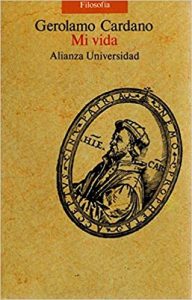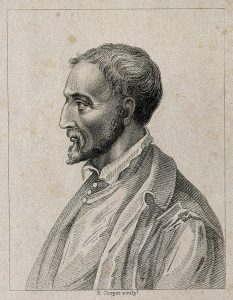
One of the most influential mathematicians, if not the most influential, of the first half of the 16th century was Gerolamo Cardano. He exemplifies well what it meant to be a “Renaissance genius” – as will be seen, that expression does not exactly have the flattering meaning usually assigned to it.
We must begin by warning that any attempt to reflect in a few brief paragraphs the overwhelming personality of Cardano, a mixture of mystic, doctor, mathematician, magician and rogue -all of it spiced with a hint of madness-, is an impossible task; perhaps even unnecessary, since we have his colourful and unclassifiable autobiography: De propia vita. I shall content myself, therefore, with noting some significant events in his life, trying, as far as possible, to take them directly from De propia vita.
Of his birth, Cardano wrote: “After my mother had tried various abortifacients in vain – so I heard – I was born in the year 1501, on the 24th of September, when the first hour of the night had not yet elapsed in full, only a little more than half of it, although not yet two thirds of it”. Cardano was the illegitimate son – hence the explicit references to his unwanted birth – of a lawyer friend of Leonardo da Vinci and a widow who was “irascible, intelligent, with a good memory, short, fat, devout”; such precise references to the time of his birth were later used by Cardano in his horoscope, details of which will be given later. He studied first in Pavia and then in Padua between 1520 and 1526, the year in which he obtained the degree of Doctor of Medicine.
For the rest of the biographical notes, I will rely on the following catalogue of misfortunes which he describes in the chapter of his biography entitled On Myself: “Misfortunes are the death – and violent death – of one of my sons, the dissipated life of the other, the sterility of my daughter, my sexual impotence, constant poverty, lawsuits, accusations, mishaps, illnesses, dangers, prison, the injustice of being put off so many times and in front of so many men lesser than myself. But I cannot rightly complain about my luck”.
 I will now add a few details to this outline. “The injustice of being put off so many times and in front of so many men lesser than me” refers to the several times – 1529 and 1537 – that, as an illegitimate son, he was prevented from practising medicine by the college of doctors in Milan until he was finally admitted in 1539. During this period he worked, among other things, as a mathematics teacher in a school in Milan. “Sexual impotence” refers to the impotence he suffered at one stage of his life; he explained its causes in the horoscope following the description of his birth: since on that day “Jupiter was in ascendant together with Venus, which dominated my entire horoscope, I did not pass without some damage to my genitals, so that from the age of twenty-one to thirty-one I was unable to have sexual intercourse”; in the same year of his cure he married. “Prison”: Cardano was imprisoned by the Inquisition in 1570, accused of having made the horoscope of Jesus Christ; after abjuring he was released but lost the chair of medicine which he held at the University of Bologna at the time – the scandal did not, however, prevent him from entering the service of the pope the following year as an astrologer, among other things. “Misfortunes are the death – and violent death – of one of my sons”: Cardano refers here to one of the most bitter episodes of his life, the condemnation and subsequent execution of his eldest son accused of having poisoned his wife; “the dissipated life of the other, the sterility of my daughter”: none of his three children made Cardano happy, although he considered himself partly responsible: “My greatest mistake was in the education of my children, because education can do a lot”. Despite the catalogue of misfortunes, Cardano was not entirely unhappy: “Although the word happiness is at odds with our condition as men, nevertheless, because it is closer to the truth to say that we can, at least in part, be happy, I will say that I have been happy in my own way”.
I will now add a few details to this outline. “The injustice of being put off so many times and in front of so many men lesser than me” refers to the several times – 1529 and 1537 – that, as an illegitimate son, he was prevented from practising medicine by the college of doctors in Milan until he was finally admitted in 1539. During this period he worked, among other things, as a mathematics teacher in a school in Milan. “Sexual impotence” refers to the impotence he suffered at one stage of his life; he explained its causes in the horoscope following the description of his birth: since on that day “Jupiter was in ascendant together with Venus, which dominated my entire horoscope, I did not pass without some damage to my genitals, so that from the age of twenty-one to thirty-one I was unable to have sexual intercourse”; in the same year of his cure he married. “Prison”: Cardano was imprisoned by the Inquisition in 1570, accused of having made the horoscope of Jesus Christ; after abjuring he was released but lost the chair of medicine which he held at the University of Bologna at the time – the scandal did not, however, prevent him from entering the service of the pope the following year as an astrologer, among other things. “Misfortunes are the death – and violent death – of one of my sons”: Cardano refers here to one of the most bitter episodes of his life, the condemnation and subsequent execution of his eldest son accused of having poisoned his wife; “the dissipated life of the other, the sterility of my daughter”: none of his three children made Cardano happy, although he considered himself partly responsible: “My greatest mistake was in the education of my children, because education can do a lot”. Despite the catalogue of misfortunes, Cardano was not entirely unhappy: “Although the word happiness is at odds with our condition as men, nevertheless, because it is closer to the truth to say that we can, at least in part, be happy, I will say that I have been happy in my own way”.
Cardano was always proud of his medical skills – especially the cure of the Archbishop of Edinburgh – and his astrological skills, which also made him famous in his time: “So three times in fifty-three years of medical practice I have made mistakes, whereas Galen did not recognise his mistakes because he had made so many that recognising them could not be an excuse”.
The following quotations are illustrative of Cardano’s ambitious, polemical, ironic and also judicious character:
“The idea and the desire to perpetuate my name took hold of me as soon as it was too late for me to aspire to such a thing. I saw clearly that there are two kinds of life, an elementary one which we share with animals and plants, and another which is exclusive to man, who seeks glory in his actions”.
“I admit as the greatest and rarest of my deviations an irrepressible tendency to say nothing more pleasantly than that which annoys my listeners. I persevere knowingly and willingly in this defect of mine. It does not escape me how many enemies I have made”.
“From time to time I have also been affected by heroic infatuation to the point of suicidal thoughts. But such things happen to everyone, I suppose, even if they are not described in books”.
“Friendship, even false friendship, I will not tear, but I will unpick it”.

Of the more than 200 books Cardano wrote, three were on mathematics: Practica arithmetica (1539), Ars Magna (1545) and Liber de ludo aleae. The first is a minor work devoted to arithmetic – using the positional system with zero – although it should not be forgotten that arithmetic was the great mathematical contribution of the Middle Ages that the Renaissance was responsible for disseminating. The third was a book on probability: the first to be written, although it had hardly any influence as it was not published until 1663, a century after Cardano wrote it. Ars Magna was the great synthesis of Renaissance algebra, the book that brought Cardano into the history of mathematics. Although the great contribution of the book, the resolution of the polynomial equations of the third and fourth degrees, were not original to Cardano – the resolution of the third degree was an independent discovery by Scipione del Ferro (around 1500) and Tartaglia (in 1535), and that of the fourth degree by Ludovico Ferrari (around 1544). At the end of the Ars Magna Cardano wrote: “Written in five years it may last several centuries”. However, the work soon grew old; for two reasons: on the one hand, lacking an adequate notation, Cardano – like all his contemporaries – had to use a rhetorical language that soon became outdated as the notation that gave algebra all the power of its generality was developed and consolidated at the beginning of the 17th century; on the other hand, the deficient understanding of negative numbers made him consider an endless multiplicity of cases. Thus, in barely a century, the Ars Magna had become a difficult and tedious book to read.
So was Cardano: capable of explaining how to solve third and fourth degree equations, but also of making a horoscope for himself – not to mention that of Jesus Christ – or predicting the day of his death for 21 September 1576 and succeeding! Morris Kline managed to describe adequately how Cardano’s mathematics was tainted with Renaissance: “Mathematics was not a method for him; it was a special magical talent and an emotionally charged form of speculation”.
References
G. Cardano, Mi vida, Alianza Editorial, Madrid, 1991.
A.J. Durán, Crónicas matemáticas, Crítica, Barcelona, 2018.

Leave a Reply